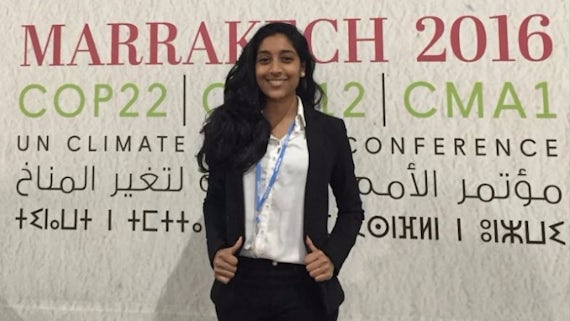Environmental Law student attends historic Climate Change conference in Marrakech
22 Tachwedd 2016

A third year Law student recently won the rare opportunity to attend a UN Climate Change Conference in Marrakech.
Nachatira Thuraichamy, who studies Law and is part of the School’s Environmental Law Clinic Pro Bono scheme, travelled to Morocco between 7 – 18 November to observe this year’s UN Framework Convention on Climate Change (UNFCCC).
The conference is the first meeting of the 197 parties of the UNFCCC since last year’s historic Paris Agreement. The agreement entered into force on the 4 November and sets out a global action plan to avoid dangerous climate change by limiting warming to well below 2 degrees Celsius.
Nachatira, along with other students of the Environmental Law and Justice module, was invited to bid for funds to attend the conference on behalf of the University. “Although there was a lot of interest amongst her fellow students Nachatira’s application stood out,” said Dr Ben Pontin, Module leader and Director of the Environmental Law Clinic. “It was strengthened by her involvement in the Malaysian Youth Delegation (MYD).” MYD is the only youth-based climate policy organisation in Malaysia. The group raise awareness and engage in capacity building to increase youth participation in Malaysian climate policy.
Giving students opportunities such as this is part of the School’s engagement mission. The Environmental Law Clinic Pro Bono Scheme which Nachatira is a part of, is run in partnership with The Environmental Law Foundation (ELF); one of the world’s oldest pro bono environmental law advice and representation charities. Professor Julie Price, who is in charge of the School’s Pro Bono provision, said, “The scheme aims to give a voice to ordinary people and communities on matters affecting the environment in which they live. Cardiff’s clinic covers enquiries relating to Wales and helps individuals and communities facing environmental issues such as air and water quality, noise pollution, threats to wildlife habitat and biodiversity, use of public open spaces and threats to those spaces.”
Speaking of her time at the conference, Nachatira said, “It was a phenomenal experience that opened my eyes to the intricacies involved in international climate policy. It was an amazing opportunity to track negotiations, understand the implications of the various positions held by the constituencies as well as learn from experts themselves.”
It is hoped that Nachatira’s opportunity at the conference will be an experience that will be shared by many more students in future as the University has recently applied for observer status to the UNFCCC. Once the University has obtained this status it will be able to offer a limited number of researchers and students the opportunity to observe these international climate change events each year.
Dr Hannah Hughes who will be the University’s UNFCCC contact point said of the status, “This will provide us with an important opportunity to experience these international events and to study their significance to the global community’s climate change response.”